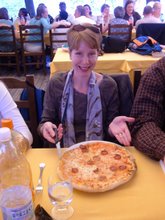In the course of a reader’s life, there are so few books one can afford to read more than once. The Elegance of the Hedgehog earns its way into a rare class of stories that makes you want to turn the book over and start again as soon as you’re finished. What makes it so? Well, for anyone who’s ever felt the sting of being underestimated, ignored, or misunderstood, there’s a quiet victory just waiting inside the head of the book’s main protagonist, 54-year-old Renee Michel.
Madame Michel’s role as a concierge allows her a solitary intellectual life that unfolds from beginning to end in a heady journey through film, philosophy, and art. But her ability to appraise the thoughts of the haughty patrons she serves is a bitter cup. What could be more brutal than to know the exact measure of your negligible worth as estimated by others? It would be great to imagine that all readers might see themselves as the arrogant perpetrators in Muriel Burbery’s novel. But, as we all know, it’s difficult to see the ways in which we judge.
Is it worse to live behind a self-constructed façade or to build one for someone else? Madame Michel’s remarkable substance permits her to retain her dignity and her humanity, despite her lowly assignment and the shackles of a distorted past. It also wins her the royal gift of friendship with people who recognize her for what she is. Isn’t this what we all hope for? This novel is a feast for the mind and the spirit, best consumed with a cup of tea. Read it and you’ll see why.
View'>http://www.goodreads.com/review/list/785799-crystal-hammon">View all my reviews
October 8, 2011
August 9, 2011
Blood, Bones & Butter: The Inadvertent Education of a Reluctant Chef
 Blood, Bones & Butter: The Inadvertent Education of a Reluctant Chef by Gabrielle Hamilton
Blood, Bones & Butter: The Inadvertent Education of a Reluctant Chef by Gabrielle HamiltonA prissy reader might be tempted to rename this memoir within the first 50 pages. Something like Food, Drugs and Cusswords would do. Or, buoyed by a highly-developed moral code, one might set it aside in favor of something sweeter on the palette. But that would be like foregoing a spectacular feast of honest food prepared by a famous chef like…well, like Gabrielle Hamilton herself.
Hamilton’s memoir is a delicious account of her arduous journey from adolescence to adulthood, hurdling obstacles and carrying baggage that might have put a lot of us on the sidelines of life. Instead, the author matures into talented writer and chef/restaurant owner, who starts her own unconventional family and begins the balancing act known to legions of hard-working women.
Thinking of glamour? Well, forget that. Her journey to chefdom didn’t include a lofty chef’s school. It was made on an itinerant apprenticeship of inauspicious greasy spoons, summer camps, catering gigs, and a hungry, sometimes harrowing traipse through Europe as a young adult. None of it paid well, but it did form an unpretentious chef who can simultaneously write and cook the glory and complexity of unfussy, unadulterated food and of life itself.
Keep your dictionary handy. All but the very most sophisticated of foodies will need it to figure out what’s in the oven or on the stovetop and table. Read to the end and take turns shuddering, gasping, salivating and aching your way through a gritty memoir filled with tenderness, honesty, self-reliance and hope.
View all my reviews
July 18, 2011
A Must Read for Readers
 Tolstoy and the Purple Chair: My Year of Magical Reading by Nina Sankovitch
Tolstoy and the Purple Chair: My Year of Magical Reading by Nina SankovitchMy rating: 5 of 5 stars
If, as Mark Twain once said, a person who won’t read has no advantage over one who can’t, then surely a person who remains unchanged by what they read is just as disadvantaged. In her memoir, Tolstoy and the Purple Chair, author Nina Sankovitch proves how much a thoughtful reader can milk out of a good book, sharing her experience of reading one book a day for a whole year.
After the devastating loss of her oldest sister, Sankovitch reads her way out of grief, fear and depression back to hope and promise. I know it sounds like a heavy theme, but her shared experience is must reading that will delight all bibliophiles. For reluctant readers who say they don’t have time to read, Sankovitch’s memoir is like a well-baited hook, demonstrating that a well-read life is a well-lived life, especially when we think about what we read.
This isn’t a work of literary snobbery; Sankovitch finds wisdom in popular mysteries and contemporary authors as well as classics. As you follow her year of reading, you’ll experience her steady recovery, not in psychobabble, but in earnest and profound descriptions of how stories and characters connect with real life.
If you’ve ever felt the loss of a loved one, don’t be surprised to find the pangs of your own heartbreak mingled with the author’s as you read. Her words are a sweet balm for one of life’s most universal experiences. By the end of the book, Sankovitch feels like an intimate friend, having shared in glittering detail what all readers love about books—their ability to transport, comfort, elevate, encourage, befriend, and finally, to chasten us into better people who can deal with all that life has to throw at us.
This one is worth reading again and again, especially as a motivating kick-start for anyone who isn’t setting aside enough time to read. In our achievement-driven world, no one is going to reward us for making time to read and think. But we’ll pay a price for not having done so.
View all my reviews
Subscribe to:
Comments (Atom)









